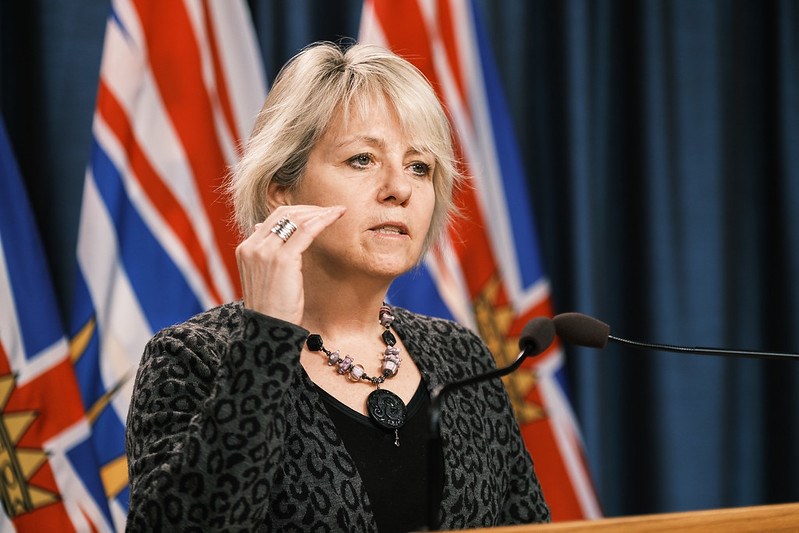The highly infectious Omicron variant of the COVID-19 virus is a game-changer, provincial health officer Dr. Bonnie Henry said Friday at a press conference held to provide guidance to those who develop symptoms over the Christmas holidays.
“What we are seeing across this country and across the globe is that Omicron is different,” Henry said. “It is spreading in a way that is very different from previous variants. In a sense, we’re in a different game, a different pandemic now.”
Omicron is more highly infectious than any of the other strains of the virus, Henry said. Data show more breakthrough infections in fully vaccinated people, but they tend to be less severe.
In addition, people who have had previous infections are much more likely to get reinfected with Omicron, she said.
But health officials still don’t have a full picture of how severe Omicron can be across the board, Henry said.
“And that is something we need to continue to monitor and watch and that is why we’re talking today about the things we need to do until we understand that in the coming weeks.”
IF YOU DEVELOP SYMPTOMS
Henry offered the following guidance on what to do if you get sick:
• If you have any flu-like symptoms or symptoms of COVID-19 you must assume you have COVID and take measures to avoid passing it on.
• If you are younger and vaccinated, you don’t necessarily need to take a test.
• If you are fully vaccinated, assume you are positive. Stay home and stay away from others for seven days.
• If you are not fully vaccinated, isolate for 10 days.
• Notify your close contacts. They will need to monitor for symptoms for 14 days.
• If you are seriously unwell, seek care immediately.
HOW OMICRON DIFFERS
Earlier this week, knowing the way Omicron was spreading, Henry said everyone would likely be exposed to Omicron. On Friday, she clarified that doesn’t mean everyone will get sick or severely sick.
She explained that the Omicron variant is more likely to attach to receptors in our upper airways and people are getting infected with very small amounts of the virus. It replicates quickly and it means those smaller particles, or aerosols, can spread the virus more easily, especially during activities like singing or talking closely indoors where ventilation is poor.
In previous strains, the incubation period — the time between exposure and getting sick yourself — was five to seven days. With Omicron, it’s down to two or three days. “So you can pass it on to others even before you realize you are positive,” Henry said.
The Omicron strain is also spreading faster in people not yet vaccinated, she said. “We know that because we see that transmission is explosive in some of those settings.”
TESTING CENTRES AT CAPACITY
The provincial health officer stressed that anyone with any symptoms — “even if you think it isn’t COVID” — needs to stay away from others, particularly those who are at higher risk or are not vaccinated.
The speed of transmission means case and contact tracing in the province can’t keep up and find contacts within the two-to-three-day incubation period, Henry said, and testing centres are at their maximum capacity. On Thursday, more than 20,000 PCR tests were done.
Henry reminded people not to go to a testing centre unless they have symptoms.
“The testing centres are not for pre-travel screening. Nor do [negative tests] give you a green light to spend time with others,” she said. “This is more important than ever: A negative test is not a green light.”
Testing is for people with symptoms, or for health care workers and emergency responders who have to rule out that they have COVID to go into work, Henry said.
Rapid testing is being used to supplement the PCR tests at the testing centres. It is also being used in remote communities to determine if the new strain of COVID-19 has made it there and to test younger people with milder symptoms, she said.
This is a very high-risk period, said Henry, who advised people to limit their interactions with others over the holiday, suggesting outdoor walks and delivering baking or meals.
“What we need is a booster shot of communal kindness right now,” she said.





